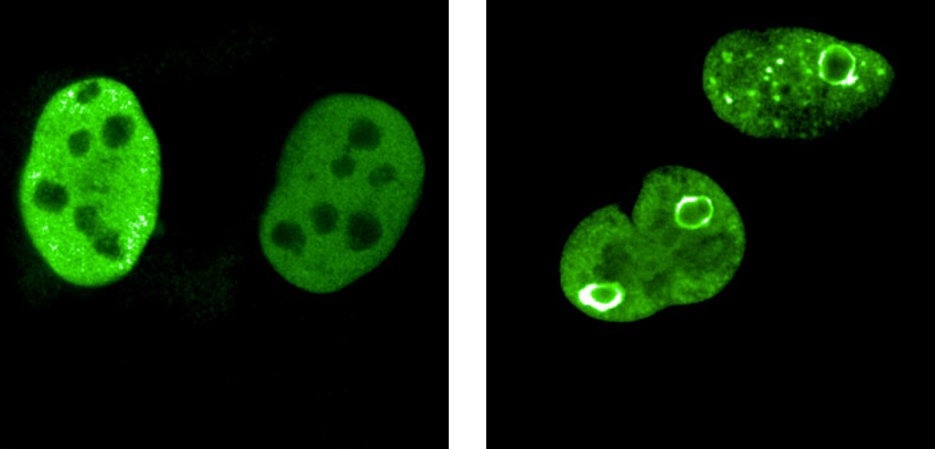As far as the field of cancer research is concerned, hollow spheres composed of MYC proteins sets the stage. Researchers from Würzburg have found them out and have reported this discovery in the Nature journal.
 MYC proteins are colored green in this figure. In normally growing cells, they are homogeneously distributed in the cell nucleus (left). In diverse stress situations, as they occur in cancer cells, they rearrange themselves, form sphere-like structures and thus surround particularly vulnerable sections of the genome. Image Credit: Team Martin Eilers / Universität Würzburg.
MYC proteins are colored green in this figure. In normally growing cells, they are homogeneously distributed in the cell nucleus (left). In diverse stress situations, as they occur in cancer cells, they rearrange themselves, form sphere-like structures and thus surround particularly vulnerable sections of the genome. Image Credit: Team Martin Eilers / Universität Würzburg.
MYC genes and their proteins tend to play a vital role in the rise and development of nearly all cancers. They drive the unrestrained growth and altered metabolism of tumor cells. Also, they aid tumors that hide from the immune system.
Also, MYC proteins display an activity that was earlier unidentified—and which is currently paving the way for cancer research: They develop hollow spheres that tend to safeguard the genome’s especially sensitive parts. If such MYC spheres are ruined, cancer cells will expire.
This was reported by a research group headed by Martin Eilers and Elmar Wolf from the Institute of Biochemistry and Molecular Biology at Julius-Maximilians-Universität Würzburg (Bavaria, JMU, Germany) in the journal Nature.
The scientists are persuaded that their breakthrough is considered to be a game changer for cancer research. It is an essential breakthrough in the method of new therapeutic strategies.
Hollow spheres protect sensitive DNA sites
What the scientists found: When cells in the laboratory are kept under stress conditions similar to those discovered in rapid-growing tumor cells, the MYC proteins in the cell nucleus rearrange themselves in a considerable method. They collaborate together to develop hollow spheres comprising thousands of MYC proteins.
The hollow spheres encircle and safeguard individual, especially sensitive sites in the genome—accurately the sites where two types of enzymes have the potential to collide: Enzymes that tend to read DNA to synthesize RNA and enzymes that duplicate DNA. However, both could be believed as two trains travel on only a single track, which is DNA.
Hence, hollow spheres avoid the two enzymes from getting collided. The Würzburg group was able to verify this observation in cancer cells. If the protein spheres’ protective function is turned off in an experimental manner, collisions of the enzymes take place and, as a result, multiple breaks happen in the DNA. This eventually tends to kill the cancer cells.
Search for specifically effective drugs
These observations revolutionize our understanding of why MYC proteins are so crucial for the growth of tumor cells.”
Martin Eilers, Professor, Institute of Biochemistry and Molecular Biology, Julius-Maximilians-Universität Würzburg
Also, the new outcomes raise the question if drugs could be developed that particularly avoid the development of hollow spheres.
To force this development forward, Eilers and Wolf have begun a company. Collectively with JMU and collaborators from the pharmaceutical industry, the search for drugs that meddle with the newly found functions of the MYC proteins has started.
The fact that investors made it possible for us to set up so quickly is certainly not an everyday occurrence.”
Martin Eilers, Professor, Institute of Biochemistry and Molecular Biology, Julius-Maximilians-Universität Würzburg
Also, they consider this as a sign that they have made a breakthrough, which is highly beneficial.